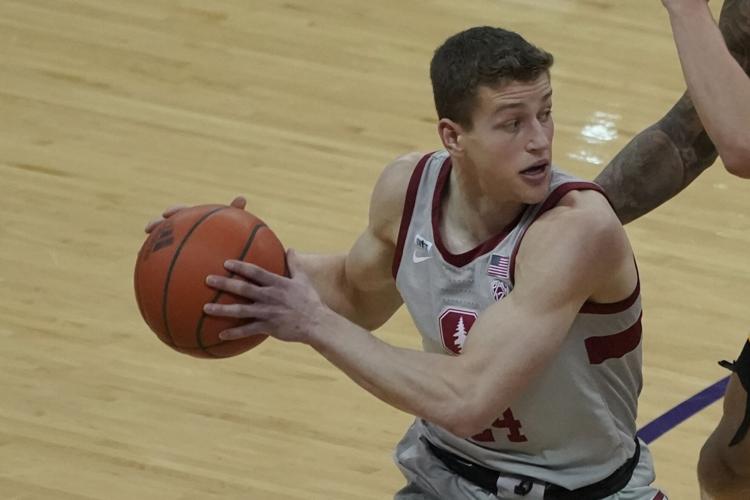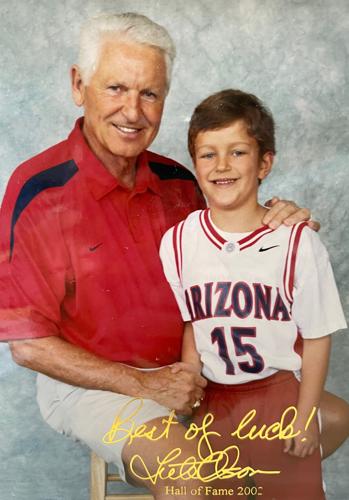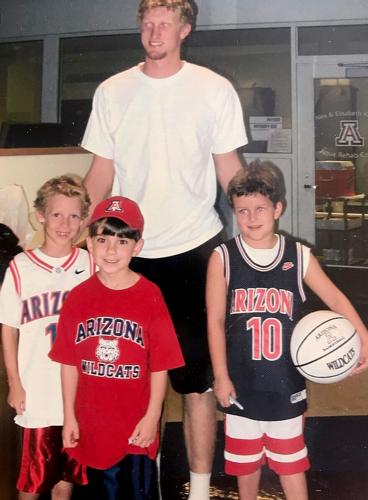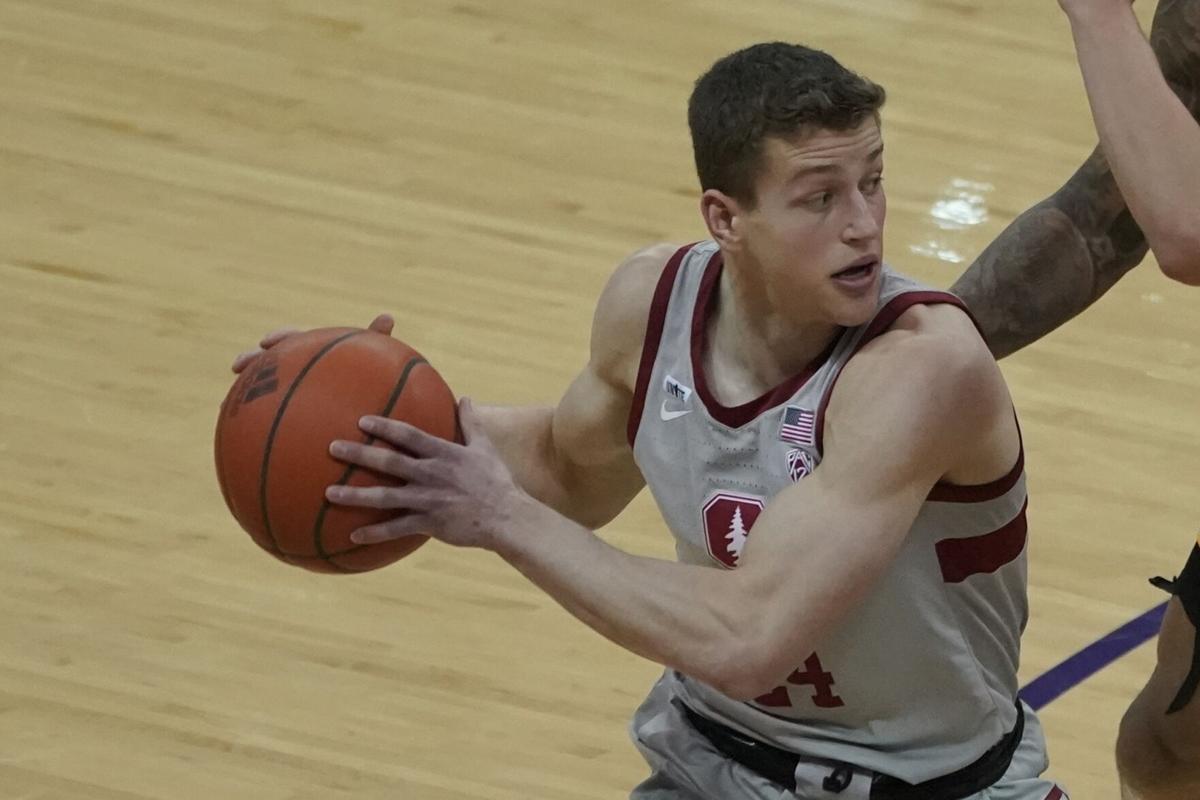Whenever an athlete faces his hometown team or a former connection of some sort in high-level competition, the usual response is something along the lines of “it’s just another game.”
Not gonna treat it differently. No big deal.
Sam Beskind isn’t about to go there.
How could the former Catalina Foothills High School standout turn his back on a lifelong history of adoring the Arizona Wildcats? Long before clawing his way up the Stanford basketball ladder from walk-on to scholarship reserve to spot starter and role player, the son of two former college athletes grew up near Sabino Canyon, unable to stay away from what Lute Olson had built in town.
“Lived and breathed it,” said Beskind, who will face the Wildcats again with Stanford on Thursday at Maples Pavilion. “Went to Lute Olson camps. Then Sean Miller camps. Whenever I could get tickets, I’d go to a game.”
Sometimes, he even got in for free. Maybe you even saw him pop out from under the basket any time guys such as Hassan Adams, Mustafa Shakur or Ivan Radenovic left sweat marks on the McKale Center floor late in the Olson era.
“I was one of those little kids who mops it up on the baselines during the games,” Beskind said.
His father helped pull the connection even tighter. Dan Beskind, an emergency room doctor at Banner University Medical Center who also teaches at UA’s medical school, came to know UA athletic trainer Justin Kokoskie.
One day, Kokoskie arranged a special treat.
“Before one of the games, we got to go into the training room where they’re all getting taped and everything,” Beskind said. “I still have pictures standing next to Chase Budinger and all those guys. I was pretty young at that time, but just meeting those guys was like a dream come true.”

Sam Beskind, far right, was all smiles when he and his buddies met former UA standout Chase Budinger.
Beskind kept growing up with the Wildcats, through the end of the Olson era, then by watching teams led by interim coaches Kevin O’Neill and Russ Pennell. He witnessed the best of the Miller era just as he was developing standout skills and knowledge of the game himself.
“I remember some epic battles when I was super young against Oregon and Aaron Brooks,” Beskind said. “Then, a little bit older, I was just wanting to see those guys get to the Final Four, with Nick Johnson and T.J. McConnell.”
That almost happened, twice, with the Wildcats losing in the 2013-14 and 2014-15 Elite Eights. That hurt everyone who followed the Wildcats in those years; by then, Beskind was also moving on with his own career.
By 2017, he played for Team USA at the Maccabiah Games in Israel and as a Foothills senior in 2017-18, he led the Falcons to the Class 4A state semifinals. He was also a finalist for the Arizona Boys Player of the Year award that went to Phoenix Pinnacle’s Nico Mannion, who played for the Wildcats in 2019-20.
Beskind’s options at the Division I college level, however, were limited. Montana State offered him a scholarship as a junior, then took it off the table and later put it back on after his senior season. By then, it didn’t much matter, because Beskind had caught the eye of Stanford assistant coaches during a holiday tournament in Palm Springs in December of his senior season.
“I got kind of lucky in a sense,” Beskind said. “We were playing a top five high school in the country and a couple of coaches were recruiting guys on the other team. Steve Alford was there for UCLA and some of the Stanford coaches were there. I happened to have a pretty good game, and they offered me a preferred walk-on spot after that.”
There was a catch, however. Beskind had to get in to Stanford.
The January application deadline was smack in front of Beskind, and he didn’t have one in the works.
“As much as I had pride in doing a good job academically in high school, the kids around here are on a different level,” Beskind said. “I was able to get an application in, but I had no idea. They said, ‘If you apply and you get in, you’ll definitely be on the team.’ So I gave it my best shot and basically I was in the dark until April.”

Sam Beskind, dunking for Catalina Foothills High School in 2018, considered Montana State before Stanford coaches said they'd add him as a preferred walk-on.
He got in. Then the hard part began on the court. Beskind redshirted as a freshman in 2017-18 while attempting the massive jump from Southern Arizona high school basketball to Pac-12 play.
“Tucson’s a relatively small basketball community, so even if you’re excelling in Tucson, it’s not necessarily a sign you’re going to be a force at the next level,” Beskind said. “It doesn’t mean you can’t ever do it. It just means there’s a lot more work to be done.”
So Beskind worked. He also worked at school, picking up his undergraduate degree after three years before deciding to pursue a master’s in management science and engineering. He worked on the court, where Stanford coach Jerod Haase kept noticing.
A hard-working standout for powerhouse 1990s Kansas teams who once wrote a book entitled “Floor Burns,” Haase says comparing Beskind’s ethic to his would only “be a huge compliment to me.”
“He’s the gold standard,” Haase says. “We do have a lot of guys in our program who are awesome in the own way, but he’s so unique and different. He’s what’s right about college basketball. The amount of respect I have for him is off the charts.”
Haase put Beskind on scholarship in 2018-19. But as much as that might have appeared about work and character, the truth of it was that Haase also found he could play at Stanford’s level at that point.
Beskind says he’s “not the most talented guy or anything,” but Haase disagrees.
“He is talented,” Haase said.
His genetics also say otherwise.
While Dan Beskind was a tennis player at the University of Vermont before doing his medical residency in Tucson, Sam’s mother, Vicki, set the University of Washington indoor high jump record with a leap of 6 feet 2 3/4 inches in 1987 — a mark that is still 1 1/2 inches better than the Huskies’ second-best-ever jump.
Vicki Borsheim, as she was known then, was an alternate for the 1992 Olympic team. She is now a Tucson physical therapist.
“My parents are my heroes,” Beskind says.
While even family members weren’t allowed at McKale Center games last season, Dan and Vicki Beskind have been able to watch their son progress into a role player Haase values.
Beskind appeared in 14 games as a redshirt freshman in 2019-20, then played another 11 last season. This season, Beskind started early-season games against San Jose State, Valparaiso and Baylor, putting up two points and two rebounds in 22 minutes against the Spartans.
Haase said Beskind’s experience and skills have helped the Cardinal mature into what is now a 10-5 team that is undefeated at home.
“We’re trying to put ourselves in the best situation to win games and he has earned minutes throughout his career,” Haase said. “I feel confident in both ends of the floor when he goes in. Defensively, he’s strong, physical, can slide his feet, understands our concepts really well. On the offensive end, he’s been through it so much that he has a great feel of what we’re trying to do.
“We’re a team that is on the younger side, and what we’re trying to do is supplement experience and he’s one of the guys that has great deal of experience. We certainly rely on that.”

Sam Beskind, right, poses for a photo with Lute Olson during one of the Arizona coaching legend’s camps.
Maybe they will Thursday, too.
If so, Beskind will be ready.
Even if he has to keep tucking that that long history under his Stanford jersey, replacing his childhood Wildcat fandom with respect as he keeps developing within a rival program.
“Growing up in Arizona, you know Arizona has just a such a storied program with so much history and great players, and obviously right now they’re doing well,” Beskind says. “So I wouldn’t say it’s just another game.”








